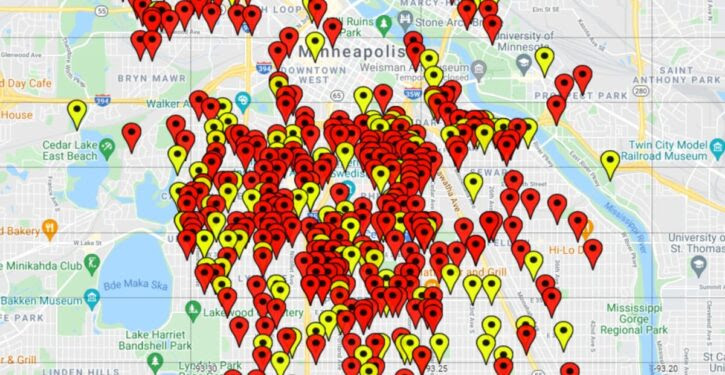
Above is a “map of carjackings in Minneapolis in 2020. Carjackings jumped 289% from 2019. Minnesota has Gov. Tim Walz is to blame for this,” says Libs of TikTok. Tim Walz is indeed partly responsible for this. He helped create an atmosphere of lawlessness in Minneapolis by refusing to deploy the National Guard for days in response to deadly riots, even after the Democratic mayor of Minneapolis came to his senses and asked him to send in the National Guard to end the rioting. As the Minneapolis Star-Tribune reported, Mayor Jacob Frey noted that “Gov. Tim Walz failed to take his requests for help seriously until it was too late. In an interview Monday, Frey said that Walz hesitated to send in the National Guard to quell the growing violence and then blamed him for allowing the city to burn.” The riots caused more than $500 million in damage in Minneapolis and St. Paul and “burned over 1,000 businesses and a police station to the ground.”
Gov. Walz and Minnesota’s progressive legislature also weakened the state’s criminal justice system, such as by reducing penalties for violent juveniles, and raising the age at which most violent offenders could be charged in the adult court system to 18.
These changes will fuel more carjacking, which is disproportionately a crime committed by juveniles. Many cities like Washington, DC now have a serious problem with carjacking, committed mainly by juveniles. WTOP reported in October that “there have been at least 113 arrests for carjackings so far this year — 65% of those arrested are juveniles.” Similarly, last year, Channel 9 reported that of the carjacking arrests in 2022, “two-thirds have been juveniles,” with the most common ages for carjacking being 15 or 16. Arrested carjackers were more likely to be age 13 or 14 than 18 or 19.
Carjackers were also often juveniles in other major cities, like Chicago. In July 2022, Chicago police arrested an 11-year-old boy for attempted carjacking. Yahoo Finance reported that “Children around that age have been arrested in carjackings in Chicago in the past. Police Superintendent David Brown at a February press conference commented on the young age of people being arrested for carjackings, saying half were juveniles, ‘and many are repeat offenders.’” WGN reported that 15 juveniles had been arrested in Chicago for carjacking “in July so far.”
This is happening because teenage carjackers know that even if they are caught, they will be treated very leniently. In 2021, two teenage girls aged 13 and 15 carjacked and killed an Uber Eats Driver in Washington, DC, a crime for which they received only juvenile detention, not prison. Juveniles often do only a short stint in juvenile detention for violence or serious crimes that would land an adult in prison for a substantial period of time. Juveniles are more likely to commit a crime if they know they won’t be imprisoned for it. “A 12-year-old responsible for emailing seven bomb threats to Maryland schools this month knew a state law would prevent authorities from bringing charges, police announced Wednesday,” reported NBC News last month. As a result, he went ahead and emailed the bomb threats. As criminology professor Peter Moskos notes, “Recidivism among 16-year-olds went up” a lot when the age for being prosecuted in adult court was raised in New York.
Cities could slash their crime rate and save lives by imprisoning more criminals. When El Salvador increased its incarceration rate, its murder rate fell by more than 90%. Jailing more criminals saved thousands of lives in El Salvador.
Soft-on-crime policies have increased violent crime and theft in many big cities. Judges and progressive prosecutors refuse to jail many offenders because of the myth of “mass incarceration.” But as criminology professor Justin Nix notes, “Given its level of serious crime, America has ordinary levels of incarceration but extraordinary levels of under-policing.”
Longer prison sentences would deter violent crimes and theft by people pondering whether to commit a crime. Crime in California fell significantly after California voters adopted Proposition 8, which mandated longer sentences for repeat offenders who kill, rape, and rob others. A National Bureau of Economic Research study found those longer sentences deterred many crimes from being committed. As it observed, three years after Proposition 8 was adopted, crimes punished with enhanced sentences had “fallen roughly 20-40 percent compared to” crimes not covered by enhanced sentences. Similarly, a 2008 Santa Clara University study found that longer sentences for three-time offenders led to “significantly faster rates of decline in robbery, burglary, larceny, and motor vehicle theft,” even after controlling for pre-existing crime trends and economic, demographic, and policy factors.
Studies of countries with short prison sentences have found that letting criminals out early increases the crime rate, making longer prison sentences a good investment.


2 comments
So, why did Walz get elected to a second term? Tell us why people rejected the Republican over and over for the Democrat? You trying to sell us that the voters are electing someone who is not doing what they want done? Why is it that you attack the candidate instead of the Democrat’s doctrine? Why don’t you tell us what Trump has to offer? He didn’t end Obamacare, he did’t build any wall or get funding for any wall from Mexico, nor did Trump “lock her up”. He tried to lead the overthrow of the government on Jan. 6, and yes, he did pass a tax cut for the rich. Kamala has zero to offer me but Trump has even less.
Carjackings actually increased by far MORE than 289 percent in Minneapolis. That 289 percent increase cited above was just for a one-year period under Tim Walz, 2019-2020. But carjacking has continued to increase since 2020. Overall, carjacking has increased 548% in Minneapolis under Tim Walz, according to Newsweek: https://www.newsweek.com/tim-walz-has-been-disaster-minnesotans-opinion-1935402